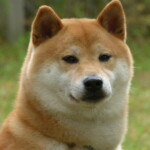Here are a few tips how to take care of your Shiba. They are based upon our own experience.
1 ) General vaccination once a year, a rabies vaccination is now valid for three years (as from 2006). However, if you are thinking of travelling abroad, it is best to repeat the first rabies vaccination after one year and after that you can repeat every three years.
2 ) De-worming at least twice a year, it is sensible to do this one week before the yearly vaccination, then the vaccination can do its work better.
3 ) Treatment against ticks and flees, certainly in the Mediterranean area, however, also very much present in The Netherlands and neighboring countries as from Spring. Always check the dog for ticks after a walk! Look for preventive measures that suit you best: a ceramic collar, or a spray, or certain alimentation (like grease cubes with garlic). Every dog is different and will react differently to each treatment.
4 ) Rather give the dog two smaller meals a day, than one big portion. Although a Shiba usually does not overeat, it is better to spread the meals.
5 ) Only comb when necessary (in principle the coat does not need this) with a brush that does not damage the double coat. When shedding coat (2x a year) the dog could be washed with a shampoo especially for dogs, and then blown dry with a water blower, you will get rid of a lot of loose hairs in one go. Should the dog be a bit dirty from playing in the mud, then wait until it is dried up, then the dirt can easily be brushed out.
6) Nails should be clipped when they do not shorten themselves while walking on hard floors. With light nails, one can see until where the quick runs in the nail, dark nails should be clipped by a veterinary or experienced dog trimmer. Should you accidentally clip into the quick, then put some flour on it to stop the bleeding. There also are certain powders available that help stop the bleeding. The more experienced dog owners could also use an electric file to shorten the nails. One should start this at an early age of the dog, otherwise you will end up with a Shiba-drama!
When feeding your dog, please pay attention if he thrives on the food. If you see that his eyes are clear, his coat is shining and he is producing good stool, then there is no reason to change food. One dog will thrive on fresh food, the other one on a kibble. I feed a kibble based on salmon, because in my opinion the omega-3 and omega-6 fatty acids are essential in keeping the double coat of a Shiba in optimal condition.
8 ) The Shiba can also eat the following things: fresh pieces of beef (no porc meat!!!), boiled minced chicken, rice (with a boiled egg it is good in case of diarrhea), a raw egg. Cheese, bread etc. will not harm him either, as long as it is never the base of the diet. And some cottage cheese and/or cultured yoghurt is good for their calcium levels.
9 ) The following items are toxic for the dog and should be avoided at all cost:
- avocados
- chocolate (dog chocolate from the pet store has nothing to do with chocolate!)
- onions and garlic in large quantities
- grapes and raisins
- walnuts and macadamia nuts
- be careful with alcohol and beer
- candy, chewing gum and xylitol
- coffee
- raw potatoes
- tomatoes and mushrooms
- food which is too cold (right from the fridge e.g.)
10 ) The following plants and flowers are poisonous for dogs:
- Dieffenbachia
- Philodendron and rhododendron
- Amaryllis
- Tabacco plant
- Tulip (bulbs)
- Daffodil (bulbs)
- Iris (bulbs)
- Wisteria
- Colchicum Autumnale
- Ilex Aquifolium and its berries
- Digitalis Purpurea
- Yew
- Castor-oil plant
- Wolfsbane
- Mistletoe
- Jimsonweed
- Henbane
Do not take any risk and go to your vet immediately in case you suspect the dog has eaten from one of these plants.
11 ) After its meal, let the dog rest for a while first, before to start a new activity. This is better for the digestion and will prevent stomach torsions.
12 ) The dog should always have enough fresh water to its disposal, especially when eating dry and hard dog food (kibble).
13 ) Toys like ropes are fine, but never let them play with plastic toys without your supervision! They could bite off a piece and swallow it (with all consequences).
14 ) Chewing strips are fine for preventing dental plaque. Also, you could accustom your dog to brush its teeth with a special toothbrush. This is not required with every dog, one individual will have more aptitude for it than another and this has nothing to do with food, but more with their saliva. Nowadays there are also sprays you can administer just before they go to sleep at night (do not let them drink anything until the next morning) to prevent plaque.
15 ) Basic needs: bench (made from steel or vari kennel), dog leash with collar (not made from steel, this is bad for their coat), a food and water bowl on a standard (stainless steel), brush/comb especially for double coat, special dog nail clipper (nails should be kept short at all times, otherwise the dog will adjust his posture with all consequences), special scissors to trim hairs between footpads (the hair cannot be too long as it will cause the dog to slide), tick remover, dog shampoo, toys.




